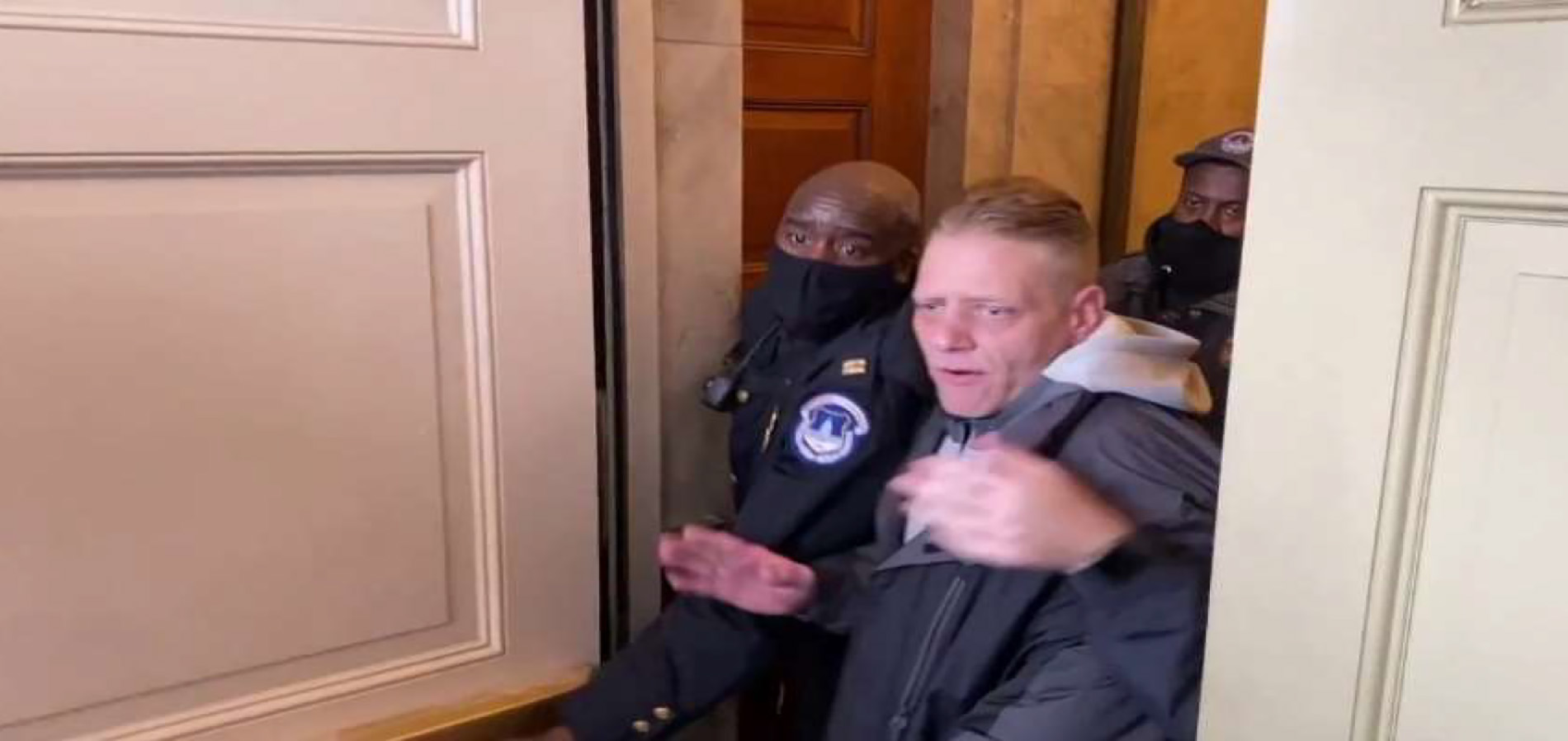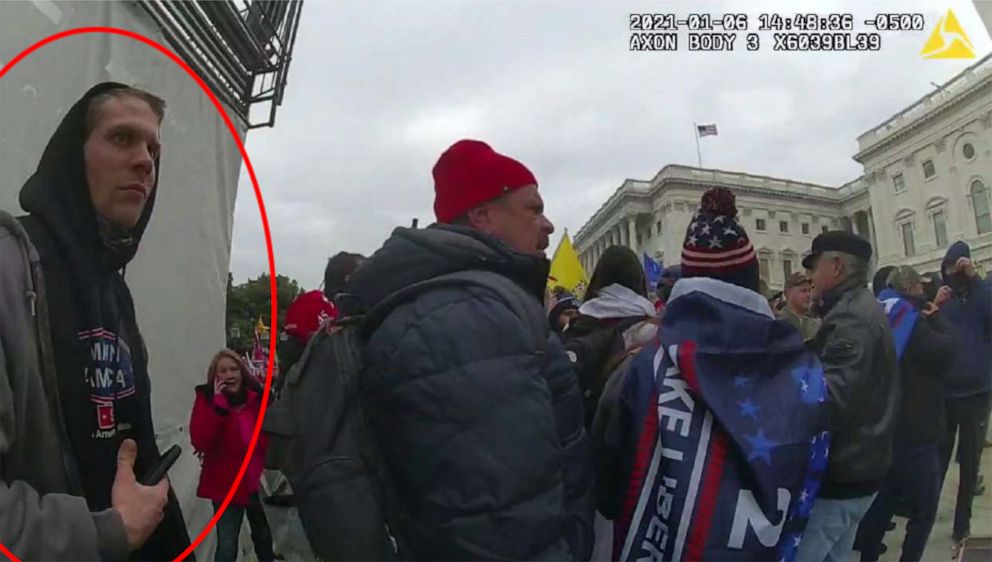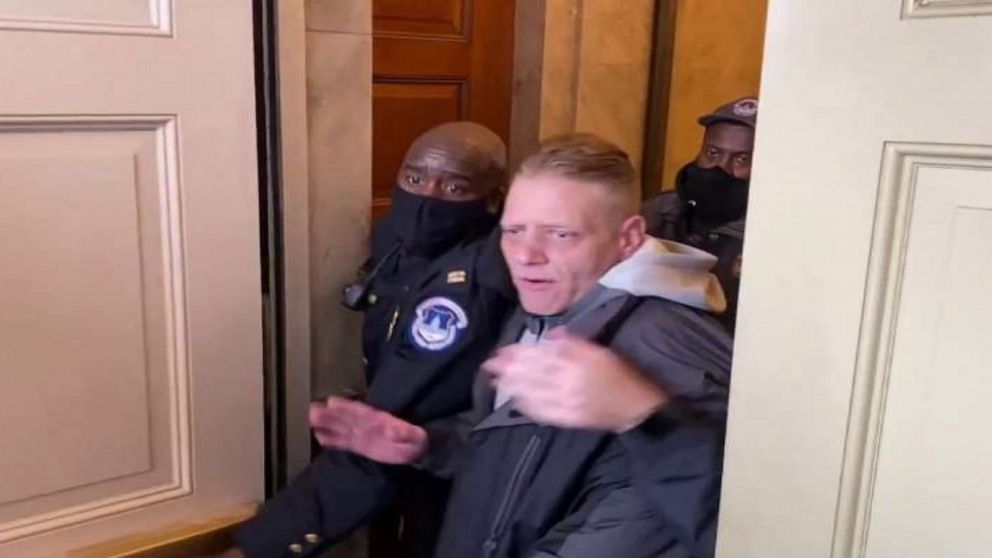Just before Jan. 6 hearing, 3 Capitol rioters express regret, ask for mercy
In the hours before the start of the first prime-time hearing on Thursday of the House select committee investigating the Jan. 6 attack on Congress, three rioters convicted on federal charges for participating in the assault appeared in court just blocks from the Capitol to plead for mercy before federal judges deciding the punishments they should face.
"I made one mistake in my life and I have immediately took responsibility for it," said Michael Daughtry, a gun store owner and former police officer arrested roughly a week after the attack on the Capitol who pleaded guilty to a misdemeanor charge this past March. "I apologize to the court for my indiscretion. But does a person not get to make at least one mistake in their entire life?"
Daughtry, who bragged after the riot on Facebook about tearing down a fence outside the building, claimed on Thursday that his post was false and he never engaged in any property destruction, telling Judge Randolph Moss, "sometimes you say stuff on Facebook."
Moss, who delivered a blunt and sobering monologue describing the Jan. 6 riot as an "assault on democracy," ultimately sentenced Daughtry to sixty days home detention, three years of probation and no jail time -- noting the government submitted no evidence showing he entered the Capitol itself or otherwise participated in any of the violence or vandalism.
"I ... think each time a judge imposes a sentence in this case it is appropriate to step back from it and think about how horrific the events of that day were," Moss said. "This was not a protest, it was not an every day event, in fact it was a singular event in US history in which the peaceful transfer of power was under assault in this country and that is, every time I think about it, chilling to the core."

Later in the day, a father and son from New York -- William Michael Sywak and William Jason Sywak were also sentenced on their misdemeanor convictions to four months home confinement with two years probation and 2 months home confinement and a year of probation, respectively.
The sentencing hearings offer a noteworthy split screen as lawmakers and their staff are in the midst of final preparations to put their investigation's findings on full display for the American people.
As the committee works to make its case for accountability for those who worked to overturn the election and ultimately foment the mob that was unleashed on Congress, the foot soldiers of that effort who have faced criminal charges from the Justice Department's parallel investigation have faced their own separate reckonings.

More than 820 individuals have been arrested and charged in connection with the Capitol assault, according to an ABC News review of public court documents, at least 300 of whom have pleaded guilty to an array of charges ranging from misdemeanor trespassing, assaulting federal officers to seditious conspiracy. Six individuals have been found guilty at trials.
The remaining more than 500 others charged have pleaded not guilty in their cases and have either vowed to fight out their charges through trial or are in the midst of negotiations with prosecutors to bring potential resolutions to their cases.
More than 169 individuals have been sentenced by federal judges, including at least 80 who have been ordered to spend time behind bars, with the most severe terms exceeding five years.
Nearly all of those who have appeared before judges set to decide their ultimate fate have issued pleas for leniency.
At times, convicted rioters have broken into tears as they recount how their participation in the riot and subsequent experience facing accountability through the criminal justice system has served to upend their livelihoods.
"I can tell you're a fair man and I just wish we had met under different circumstances," rioter Scott Fairlamb said in a sentencing hearing last November when addressing D.C. District Judge Royce Lamberth. "I just hope that you show some mercy on me sir and let me get back to my life as the proud man I am."
Lamberth sentenced Fairlamb, a New Jersey gym owner who punched a police officer in the face during the riot, to 41 months behind bars.
A month later, a Florida man accused of throwing a fire extinguisher and wooden plank at police outside the Capitol similarly broke down as he pleaded for a lenient sentence from D.C. district judge Tanya Chutkan.
"I'm really, really ashamed of what I did,” Robert Palmer said as he choked back tears, before receiving the harshest sentence handed down to a rioter thus far, 63 months in prison.
In hearing after hearing since the first sentence was handed down in a Jan. 6-related case in July of last year, convicted rioters have put forward a range of different excuses for their actions -- many pointing the finger to former President Donald Trump and conservative media outlets who pushed lies about a stolen election while framing the Electoral College certification as the final opportunity to prevent Trump's removal from office.
A common refrain has been rioters claiming they were "caught up" in the heat of the moment, just one participant amid a mob of thousands urged directly by Trump during his speech at the Ellipse to march on the Capitol where lawmakers were convening.
Trump himself has in various statements and public remarks over the past year and half has increasingly sought to rewrite the history of Jan. 6, describing his supporters who joined the storming of the Capitol as "patriots" and "peaceful people" and casting those who have been arrested as "political prisoners."
Attorney General Merrick Garland has faced a torrent of criticism from lawmakers, legal experts and even judges who have argued the Justice Department has thus far seemingly ignored higher-profile individuals like former President Donald Trump and his allies in its investigation into the riot, instead focusing on prosecuting the foot soldiers involved in the breach of the building.
For his part, Garland has defended the pace of DOJ's investigation, which in recent months has shown significant signs of expanding well beyond just the rioters who joined the mob.
Prosecutors have returned seditious conspiracy indictments targeting the leaders and senior members of the Oath Keepers and Proud Boys, alleging both the far-right groups engaged in separate coordinated plots to disrupt the peaceful transition of power.
Grand juries have also issued subpoenas in recent months seeking information and testimony about the organizers of the "Save America" rally that preceded the riot and any effort by executive branch or other officials to obstruct the certification of Biden's win.
Other recently issued subpoenas have sought information on the effort pushed by lawyers close to Trump to send slates of fake electors to Congress from states Trump lost in order to have then-Vice President Pence potentially count their votes instead of the lawful electors for Biden.




